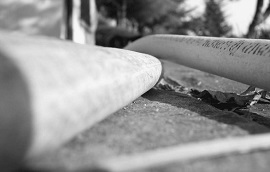Homeowners are often aware that a sudden and severe dip in the outside temperature can cause plumbing issues including burst pipes. Unfortunately, there is another consequence of burst pipes and changing temperatures; damage to your HVAC system.
How Cold Temperatures Affect Your Pipes:
When extreme cold makes the pipes contract, the water molecules move closer together, increasing the density of the water. As the water becomes denser, the Hydrogen bonds make the molecules align to trigger further expansion. This process continues until the water becomes frozen. Eventually, enough water will be frozen to form a pipe blockage. This blockage does not cause a break. A break is actually caused as the pressure is built up downstream of the blockage. This pressure continues to build between the obstruction and the closed faucet until a split forms and the pipe bursts.
The Potential HVAC Danger:
The same process can also impact the components and lines within your HVAC system. The condenser and other components which contain water could be vulnerable to this type of damage. Unfortunately, a burst or cracked pipe may be more challenging to locate inside your HVAC equipment. It can also be problematic if the burst pipe is in your air conditioner and it is left unused until the warmer weather. This delay could mean that you are totally unaware that the performance of your system has been compromised until you need it the most.
Protecting Your HVAC System:
One of the most vital forms of protection for your HVAC system should be a complete inspection before summer. An inspection will provide the opportunity for any damaged components of mechanical issues to be diagnosed and repaired before you need to use the equipment. Ideally, your HVAC system will be checked twice each year. One inspection should be performed in spring before the hot summer temperatures develop and you should also have a Home Utility Maintenance check on your heat pump or furnace before the weather turns cold.
You can also protect your HVAC system from burst pipes by wrapping the pipes in insulation. This will not only help to prevent broken pipes in cold temperatures, but it can also assist in the prevention of heat loss and improve efficiency. Foundation and basement walls can be caulked to plug any cold air openings. Additionally, insulating your attic will further help to keep the warmth inside your home.
If your area is experiencing a cold snap, you should leave faucet taps slightly on to allow a small amount of water to trickle out. This will keep the lines open and ensure that pressure cannot build up inside the pipe. It is also a good idea to leave your sink cabinets open to allow the heat inside the room to warm the pipes a little. While this may seem like a lot of work, it is far easier than dealing with a burst pipe. Prevention can minimize the risk of a burst pipe and the need to call in a professional for potentially costly repairs.
